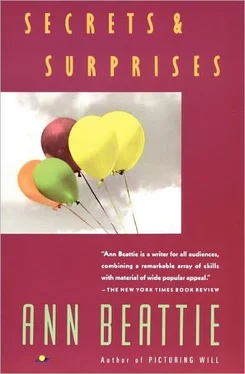“She’s a nice person,” Diana said. “Why don’t you care about her feelings?”
“I do — it’s just that we’re so different that we can’t come close to understanding each other. Look, it’s simple: Louise didn’t have a famous father, so she doesn’t know what it’s like. I’ve missed you so much because we could talk, we could know things and not have to say them, couldn’t we?”
She could not believe that he had said that. And because he had ruined her evening, she spoke without thinking that it did no good to argue. “No, Griffin. All our time together should have taught you that I didn’t agree with you, that we didn’t have that common bond.”
“You know we did,” he persisted. “The nightmares told you that, didn’t they? That wasn’t me putting thoughts in your head; that was your head telling thoughts to you.”
“Why did you call to put me through this again?”
“Because you have to know it. You have to know that it’s all right, and that you’ve got me — you can have me again in a second — that you can work through it. He’s going to vanish. He might expand from a tombstone to a tower, but eventually the tower will topple. But don’t give in — don’t quit school and not come back to me. Don’t—”
“Stop it!” she said, so loudly that people turned to stare at them.
“Please,” he said, taking her arm. “I didn’t tell you that day in New York when Peter sent us off on a walk, but I think about it every day, and it’s still clear in my head and I can still tell you about it.”
“Tell me what?” she said. She began to wonder, as she had after the car crash, as she did so often when they argued, if he might really be crazy.
“What I was trying to say before: that your father’s dead—”
She threw off his arm and ran, praying he wouldn’t follow. And by the time she had gone several blocks she felt free, his voice had stopped ringing in her head. She looked back, thinking she would see him, but she had left him behind. She had missed him, in spite of his obsession, and it angered her that that was so, because of what he had just done. She remembered what her father had told her one time when she came home crying from grade school because she wasn’t selected to be on anybody’s team: “It’s hard, but that’s what life is like, and you’re very special, so you’ll see that sooner. You know, I’m an outsider too — if I hadn’t been a poet, I wouldn’t have been fit for much of anything else. And even outsiders hate other outsiders: poets hate novelists, painters look down on sculptors …” The rest of what he said was blurry, but she remembered the feel of his hand on her shoulder, felt it there as she moved down the street and walked more than twenty blocks home because as she looked down at the sidewalk, remembering, she didn’t think to take a bus or a cab — she just kept putting one foot in front of the other, as the sidewalk kept lengthening.
We live in a house divided into five rooms, heated by a wood stove. When Carlos finished building his house, a friend gave him furniture: three beds, so there are three bedrooms and a living room and a bathroom. In one of the bedrooms is a refrigerator and a sink and a hotplate on top of cinder blocks.
The marionette-maker, Carlos, supports us. His friends Nickel and Dime come by and leave cigarettes and fiddle strings and Jordan almonds (lint-specked from the pockets of their flannel shirts). The baby puts all of these things in her mouth, and when she has nothing else, sucks her finger until the corner of her mouth is raw. She sleeps on a mat by the wood stove, far enough away so that the cats are closest to the warmth. The cats, five of them, belonged to Dime, but one by one Dime brought them to live with us. There is also an old mutt, thirteen years old, part hound and part coyote, legend has it, with a missing tail. This dog is devoted to the baby, as is the sleek gray cat, who looks too noble to be in this house, but whose specialty is killing bats.
Nickel’s real name is Nick. His best friend, Dominic, had been nicknamed Dime before he met Nick. Because they were best friends, the rest of the joke seemed inevitable.
Nickel brought me here to live. I was living with my aunt, and the baby, and waitressing the night shift at a restaurant. I lived with her when I was pregnant and for nearly a year after the baby was born, with her caring for the baby while I worked, until she told me she was getting married.
Nick came for me in his old Mercedes, with a velvet-covered, foam-padded board for a front seat, and drove us to Carlos’ house. All the time I was hoping he’d tell me to come to his house — that his large, scarred hand would shyly slip into mine, and that I would go with him. The wind chimes dangled from the handle of the glove compartment and the baby kept lunging for them. Our cat was in the back seat, pacing, meowing. She didn’t like living with the gray cat and ran away our first week at Carlos’ house. Inside the car were little square mirrors. There was a full moon, and when the trees were not dense along the road I could cock my head and see my profile in the mirror glued on the passenger-side window, or bend forward to take the chimes out of the baby’s sticky fist and see my eyes in the mirror on the dashboard. Nick was grumbling about what a bad thing it was that the Mass was no longer said in Latin. The front left headlight had burned out, and he smoked grass and drove seventy all the way there. No cop had ever stopped the car.
I first met Nick at the restaurant about a month before. He was there trying to sober up Dominic. It was the end of my shift. When I got off, I went out to my aunt’s car, which I parked in the field behind the place, and saw the two of them, in the Mercedes, doors thrown open, weeping. Dominic was alcohol-sick, and Nick was sick of being called from bars to round him up. I talked to them, and pretty soon we started to laugh. Dominic passed out in the back seat, and Nick and I drove for hours, going in circles, because he was a strange man I had just met and I was afraid to go anywhere with him. I told him about my baby, my aunt. He told me that he had lived with a woman named Julie for seven years. He had met her when he went to college in the Hudson Valley in 1965. Her father gave them money. They always had money. Every Valentine’s day she cut hearts out of red paper and wrote love messages on them and glued them together in a circle, points touching. He took his hands off of the wheel, curling his fingers and looking into the empty circle between them. We went to a bar, had three drinks apiece and danced. We went back to the car and he opened the door for me. I sat down and put my hands beside me, bracing myself already for his fast driving, and it shocked me to feel the material: I was confused and thought that it was something living that I was sitting on — soft, chilly moss. The dome light came on again when his door opened, and I looked down to see the royal-blue velvet. In the back seat Dominic was very still, no expression on his face, his hand cupped over his fly.
We drove a long way without speaking, until a big black dog ran in front of the car.
“Do you have a dog?” I said.
He shook his head no. “Dime’s got five cats.”
“Does she really love you?”
“I don’t know. I guess so.”
“Should I stop asking questions?”
“I’m not giving very good answers.”
“Aren’t you afraid to drive so fast?”
“I used to work in the pits, repair race cars.” He turned his scarred hand toward me. “I don’t have any awe of cars.”
“There,” he said, pointing across a field. “That’s where I live.”
The silhouette of a big barn, no house nearby. No lights on in the barn.
Читать дальше












